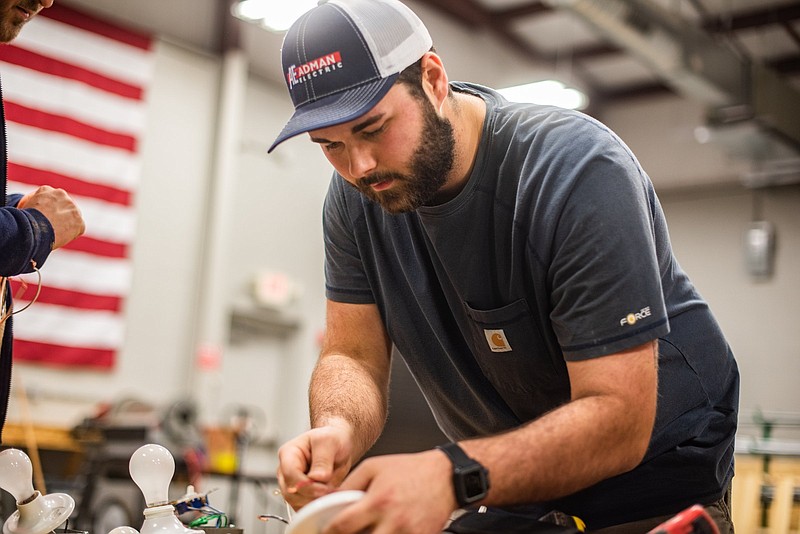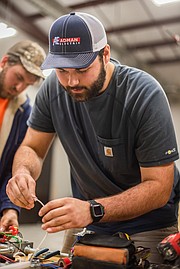Robert Hartman sees his future with a clarity that some might consider unusual for a 22-year-old.
A graduate of North Jackson High School in Stevenson, Ala., he now lives in Fort Payne. He's employed by Chattanooga-based Adman Electric, but spends most weekdays working for Adman at Scottsboro's Vulcan Materials Co. plant.
Hartman's plan is to spend two evenings for each of the next four-and-a-half academic years honing his craft at the Chattanooga Electrical Apprentice Training Center (EATC).
"It makes for some long days," he says, "but toughing it out now means it'll be better – and more money – later on."
A joint enterprise of the International Brotherhood of Electrical Workers (IBEW) Local 175 and the National Electrical Contractors Association (NECA), the EATC has been training electrical apprentices since 1949. Kenny Smith, the center's longtime training director, estimates the center has turned more than 2,000 apprentices like Hartman into "journeyman wiremen" in the past 70-plus years.
"The school is free – the Chattanooga Electrical Apprenticeship puts every apprentice on scholarship. That's $16,500 for five years, so there's no debt when you leave," Smith says.
"And apprentices are paid while they're in the program – an apprentice who stays for five years will make in excess of $180,000 during that time. Then, after graduation, you're probably going to land a job that can pay $60,000 to $70,000 per year to start.
"At the end of the day," Smith says, "what you're looking to do is support yourself and your family."
Hartman says he worked all through high school. After graduation, he enrolled at Northeast Alabama Community College – but the prospect of getting an early start on his career was too tough to resist.
"I studied industrial maintenance but as I took more electrical classes, I was drawn to that side of it," he says. "I stayed [at Northeast Alabama] about a year then branched out and started doing this."
Smith says the "academic world" looks at career/technical education as an alternative to college, but he sees it differently.
"I just look at it as another path," he says. "I graduated from this apprentice program and [the University of Tennessee at Chattanooga], and I had to work hard in each case."
Smith estimates he's "probably been to every high school in 20 counties" to talk to students about the vocational path generally and electrical training in particular. He says about half the training center's apprentices come from outside Hamilton County.
"When I talk to those students, I give them both sides – the main disadvantage is that this can be a very demanding job," Smith says. "The advantages are that there are three retirement programs they don't pay into, 'Cadillac' insurance and good pay.
"I see more impatience than I did 20 years ago – 'Why does it take five years to start making the good money?' The reason is that this is complex work – there's a lot to be learned, especially math," he says.
Smith says that each April, about 100 apprentices are chosen from roughly 550 applicants. Some of those applicants will have gone to college, he says, but failed to find work in their chosen fields.
"Twenty years ago, we had about 260 apprentices in the program," Smith says. "We've got 460 in the program this year, and we'll have north of 500 next year."
The newly chosen apprentices will get some preliminary training ahead of a summer "boot camp," Smith says, and start their first year in earnest right after Labor Day. The training center follows the traditional academic year, with the first half of a given year ending in December and the second half picking up in January.
Read more in this month's EDGE Magazine:
Volkswagen flips the switch with electric vehicles in Chattanooga Learning and earning: Paid training programs unlock opportunities for workers Get to work: Investments in the Chattanooga area workforce grow along with demand for skilled workers

